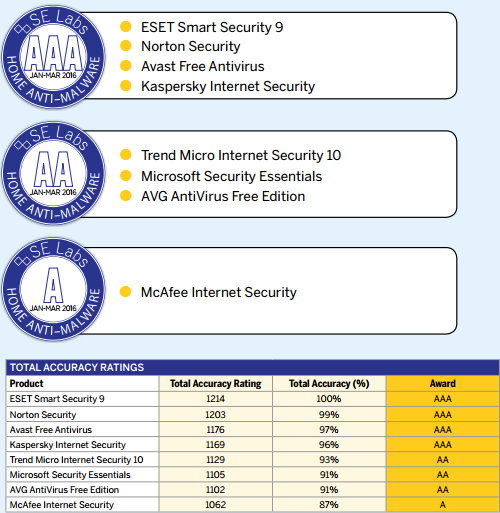- Apr 25, 2013
- 5,355

TOTAL ACCURACY RATINGS

PROTECTION RATINGS


LEGITIMATE SOFTWARE RATINGS

CONCLUSIONS
Attacks in this test included infected websites available to the general public, including sites that automatically attack visitors and attempt to infect them without any social engineering or other interaction. Some sites relied on users being fooled into installing the malware. We also included targeted attacks, which were exploit-based attempts to gain remote control of the target systems.
ESET Smart Security stands out as the one product that blocked every threat, including the targeted attacks. It was not compromised once and handled the legitimate applications and sites without error.
Symantec Norton Security was able to fend off the exploit-based targeted attacks fully, while also blocking most of the public web attacks, some of which were powered by criminals using exploit kits. It neutralised three attacks and handled legitimate applications and websites almost without error.
Avast Free Antivirus was the strongest free product in this test. It protected against all but one of the public web attacks and lost out to only three of the targeted attacks. It made no mistakes when handling legitimate objects.
Kaspersky Endpoint Security pushed away all but one of the public web-based threats entirely but was
compromised by four of our targeted attacks. It was particularly effective at stopping threats by blocking within the web browser, thus preventing the threat from starting its attack. This software was also entirely effective when handling legitimate objects.
Microsoft and AVG struggled with the targeted attacks, each allowing 10 to succeed. However, they were largely effective against the public attacks. While Trend Micro’s product was slightly less accurate when handling legitimate objects, it scored higher ratings than the other two because it blocked more threats than AVG’s product and protected more often than Microsoft’s.
McAfee Internet Security scored the weakest ratings in this test. Perhaps surprisingly, this was not related to the targeted attacks, against which it worked quite well. It allowed 11 web attacks to compromise the target system, although its perfect handling of legitimate applications and websites helped it achieve an A award.
Four products performed very well and achieved AAA awards. These were from ESET, Symantec (Norton), Avast and Kaspersky Lab. Their strong overall performance is to be commended. Those from Trend Micro, AVG and Microsoft achieved solid AA awards, while McAfee’s product is awarded an A.
Full Article
